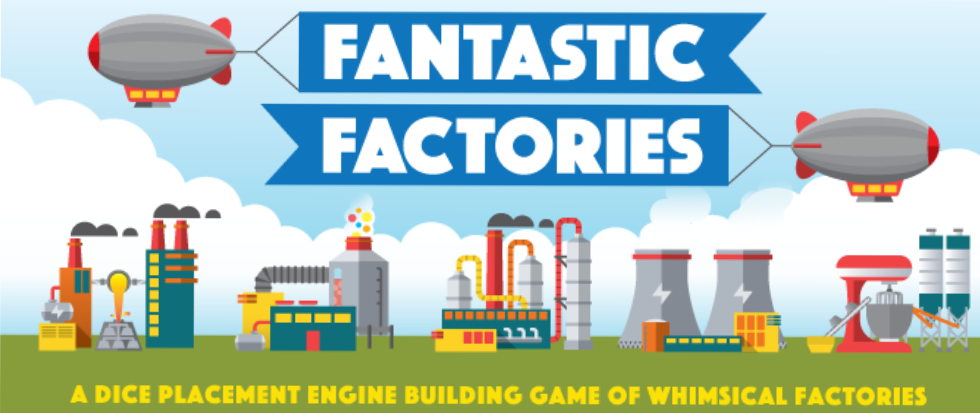
Joseph Chen on the Minimalist Design of Fantastic Factories
Five hours after the launch of its Kickstarter campaign, Fantastic Factories met its funding goal. As of this writing, it has earned nearly $93,000, a staggering 600% of its original $15,500 objective.
“We did not expect to get funded so fast,” says Joseph Chen, the designer of Fantastic Factories. “We launched with our expectations tempered as to not be disappointed. But I think that the campaign has been going so well it has exceeded even our wildest hopes.”
It’s tough to say exactly what has drawn droves of backers to fund the game, but a safe guess is the the minimalist design of Fantastic Factories’ gameplay. To Chen, it was important to make the game with as few moving parts as possible, and to keep the core gameplay the same regardless of player count.
In fact, one of the things Chen is most proud of in the game’s design is how little it changes at different player counts. “Some games require you to add or remove cards, or reveal or hide parts of the board [at different player counts]. But Fantastic Factories remains the same, which makes setup a breeze and easy to remember. I’ve always admired elegant designs that can pack a ton of gameplay with as few moving pieces as possible,” he says. “Minimalism to a certain extent became a part of the design philosophy so every decision that was made had to be made through this lens.” The resulting game is an easy-to-teach experience with a small footprint.
Fantastic Factories is billed as a “dice placement, engine building” game. On any given turn, players will roll dice and use them to gain resources or build new buildings that increase their dice placement options. That’s the crux of engine building: growing your options to increase efficiency and resources.
“We gathered some of our favorite mechanics from our favorite games and made that our design goal,” Chen said when I asked about his inspirations. “We wanted to combine the engine building of Race for the Galaxy, the dice manipulation of Alien Frontiers, and the simultaneous action selection of 7 Wonders.”
By day, Chen is a software engineer, leaving his evenings to focus on game design. It took more than two and a half years to develop Fantastic Factories, during which Chen and his wife celebrated the birth of their first child. While it hasn’t changed the design direction of Fantastic Factories all that much, becoming a parent certainly has Chen thinking about future projects: “It will be a long time before he’s old enough to play,” he says, “but perhaps one of [my future games] will be designed specifically so I can play with my son.”
For Chen, the road to Kicstarter has been a long one that has involved a glut of research, planning and marketing. “The most stressful part is probably the timing and the deadlines,” he says, noting that he set up Fantastic Factories‘ Kickstarter page a full month before the campaign launch. But as difficult as the journey has been for him, Chen has come to appreciate the victories along the way. “Getting each part done was really satisfying because it felt like a very concrete step towards that end goal.”
Where other tabletop games on Kickstarter might incentivize potential backers with extra content in the form of funding stretch goals, Chen has taken a different route. In the case of Fantastic Factories, he felt that the core mechanics of the game were polished enough that he did not need to offer gameplay-altering stretch goals. Instead, all stretch goals are focused on component quality and cosmetic upgrades. These include a thicker game box and double-layered player boards.
“I think backers deserve to have the full and complete game from the very beginning,” Chen said regarding the stretch goals. “So far we’ve receive mostly positive feedback, so I’m very grateful for our backers.”
It’s been a long road for Chen, but the finish line is in sight. As of this writing, there is still plenty of time to back Fantastic Factories, but the winding down of the Kickstarter campaign represents years of hard work. For now, though, Chen will continue to demo and market the game at conventions in order to drum up more enthusiasm in the lead up to its spring 2019 release.





